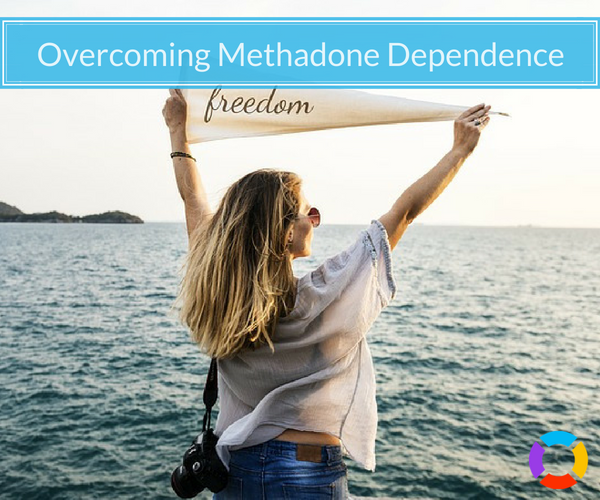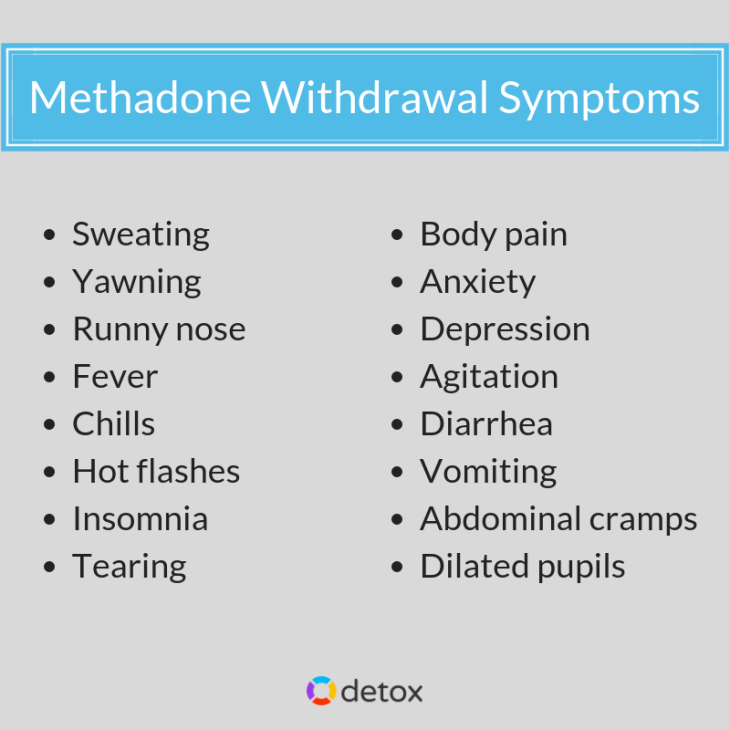Methadone Detox: Signs, Symptoms & Tips to Help YOU Detox from Methadone

Methadone detox is a critical first step toward recovery for many individuals with methadone addiction. It offers safe and supportive interventions to help you to overcome withdrawal and prepare you to move toward a healthier and brighter drug-free future.
Call now to find methadone detox centers near you!
What is Methadone Used For?
Methadone is a synthetic, long-acting opioid agonist. It’s used to treat opioid use disorder and, in some cases, to treat pain associated with certain medical conditions such as cancer or chronic intractable pain that doesn’t respond to other treatments. Methadone is a Schedule II drug due to the high likelihood of dependence with use.
It’s been approved by the Food and Drug Administration to treat opioid use disorders and can be an important component of a comprehensive treatment plan for eligible individuals. How methadone works is by curbing cravings, easing withdrawal symptoms and blunting or blocking the effects of other opioids.
Methadone can be a valuable tool in the management of pain. It works by blocking pain signals in the brain. Another benefit of using methadone for pain is its long half-life. This can range from 8-59 hours, with the average being around 24 hours. Methadone’s lengthy half-life results in extended periods of pain control between doses.
Is Methadone Addictive?
Methadone is not addictive when taken as prescribed under a doctor’s supervision. However, it does cause dependence. When abused or used illicitly, it can result in addiction. Individuals who’ve used methadone for short periods for up to a couple weeks can develop tolerance and show signs of dependence. This means they exhibit signs of withdrawal when usage stops.
For this reason, tapering off methadone doses is a much safer option than going “cold turkey.” The safest way to withdraw from methadone dependence is through a supervised medical detox.
For others, methadone use goes beyond dependence to addiction. This can be especially true for people with a history of addiction to other opioids such as heroin or morphine.
According to the Substance Abuse and Mental Health Services Administration (SAMHSA), addiction is defined as a chronic disease where people compulsively seek and use drugs despite harmful consequences.
Methadone addiction results when the brain adapts to repeated use by decreasing its dopamine response. This leads to tolerance and often causes the individual to take the drug more frequently and at stronger doses to get the desired “high.”
Methadone and Co-Use Dangers
Methadone can be a very useful drug, but when mixed with other substances, such as central nervous depressants like alcohol or benzodiazepines, using it can be dangerous. Central nervous depressants work by slowing down brain activity that results in relaxation, sedation and drowsiness.
Using alcohol or benzodiazepines with methadone can drastically lower your low blood pressure and create respiratory depression that can lead to death. Combining methadone with other drugs increases the potential for individuals to develop polysubstance use disorder, making recovery more difficult.
Methadone Withdrawal: Symptoms, Timeline and PAWS
Methadone withdrawal usually begins within the first 30 hours after the last dose and peaks at about three days. The acute phase of withdrawal differs from person to person, but on average lasts around 10 days.

Here are some methadone withdrawal symptoms during the first 10 days:
- Nausea or vomiting
- Diarrhea, abdominal cramps and gastrointestinal discomfort
- Insomnia
- Anxiety and restlessness
- Agitation
- Mood swings
- Depression
- Muscle and bone pain
- Excessive sweating and chills
- Flu-like symptoms
- Nasal discharge
- Dilated pupils
- Intense cravings
- Tachycardia
- Hypertension
Post-acute methadone withdrawal is commonly called PAWS and refers to the persistent withdrawal symptoms that can last for weeks or months after the last dose of methadone.
Symptoms of PAWS are the following:
- Fatigue
- Trouble sleeping
- Anxiety
- Depression
Dangers of Methadone Withdrawal
In most cases, methadone withdrawal is an unpleasant experience. Very rarely, it’s lethal. Symptoms such as diarrhea and vomiting can lead to dehydration and electrolyte imbalances that can result in coma, seizures or irregular heart rhythms.
Underlying medical conditions such as hypertension, diabetes and epilepsy can be made worse during the withdrawal phase and should be addressed by a medical provider immediately.
Don’t risk detoxing alone! Call today.
Some individuals experience anxiety and depression during withdrawal. These conditions can worsen for those with existing mental health issues and can lead to suicidal ideation or actions.
Since these symptoms can be severe, the risk of relapse as individuals often try to find relief. Many also have a high risk for methadone overdose during this time because of decreased tolerance to the drug.
For these reasons, medically supervised methadone detox is the safest way to manage the earliest stages of recovery. Medical staff watch for methadone overdose symptoms and provide interventions to make the process easier and safer.
Methadone Detox Options
Deciding what type of detox program to undertake for methadone withdrawal depends on several factors. These include the severity of the addiction, length of use, dosage, underlying mental health or medical conditions or polysubstance use.
Inpatient Methadone Detox
An inpatient methadone detox program provides structure and supervision that’s beneficial for individuals with moderate to severe addiction and co-occurring mental and medical conditions.
Inpatient medically supervised methadone detox offers close supervision and support. This 24/7 monitoring allows for early interventions in the event of emergencies.
Individuals may receive intravenous fluids or nutritional supplements, and medications to ease vomiting or diarrhea or for anxiety or insomnia.
Additionally, they receive emotional support and encouragement as they go through the process. Inpatient allows the individual to get away from external stressors and triggers that fuel their addiction and could contribute to relapse.
Inpatient methadone detox requires you to reside at the treatment facility. This often causes an interruption to personal commitments such as family or work. The cost of inpatient treatment is also generally substantially higher than outpatient treatment.
Outpatient Methadone Detox
Outpatient methadone detox provides the flexibility of going home each night. This type of treatment is best for individuals with mild addiction to methadone, a low relapse risk, a strong support system and aren’t at risk of potential medical complications.
Individuals detoxing from methadone should always do so under the guidance of the prescribing provider. The safest method includes gradual tapering off, monitoring for severe withdrawal symptoms, interventions if needed and planning for continued treatment that may include an intensive outpatient or partial hospitalization program.
Outpatient methadone detox offers less supervision and may increase the risk of relapse due to exposure to triggers and cravings. During outpatient care, individuals can continue to work, attend school, or take care of their families. The cost of outpatient treatment is lower than inpatient, making it a better financial option for some.
Outpatient detox may involve comfort medications to ease withdrawal symptoms like anti-nausea, anti-diarrheal, or non-opioid pain relievers to ease symptoms. In some cases, methadone itself is used in a tapering protocol. This approach may require you to attend a licensed opioid treatment program (OTP).
Rapid Detox
Rapid methadone detox is a process where the methadone withdrawal process is sped up through medical intervention. This process is completed at an inpatient hospital or clinic. During the process, individuals are put under general anesthesia and given an opioid antagonist such as naloxone.
This method of detox isn’t without risk. The process can cause extreme stress on the body that can lead to cardiac arrest or even death. It also doesn’t get rid of all withdrawal symptoms, which can persist for days after detox.
The risk of relapse is higher because people may return to methadone use in an effort to relieve lingering withdrawal symptoms.
This method of methadone detox can be expensive and may not be covered by insurance.
Tapering off Methadone
Tapering is a process of gradually decreasing the dosage over an extended period. There’s no set time frame for this process. The amount of time depends on factors such as duration of use, polydrug use, comorbidities and current dosage. This process allows for better management of withdrawal symptoms and monitoring for complications.
Tapering doesn’t usually require an inpatient stay, so individuals can maintain their daily routines.
Clean living is possible. Don’t wait to get help- Call today.
Methadone Withdrawal Treatment: What Helps?
Buprenorphine and naltrexone are FDA-approved to treat methadone addiction. Buprenorphine is a partial opioid agonist. It binds to the same receptors in the brain that methadone and other opioid medications do, but has weaker effects.
The use of buprenorphine in methadone withdrawal treatment can’t be initiated for at least 24-36 hours after the last dose of methadone.
Naltrexone is an opioid antagonist that blocks the effects of opioids, specifically the euphoria and sedation associated with their use. Naltrexone is used in addiction programs, but only after the withdrawal period is over. Treatment can’t be initiated until an individual has completely detoxed from methadone or other opioid drugs.
Medication alone isn’t enough to treat methadone withdrawal and addiction. They’re supportive interventions that are used along with behavioral therapies. Cognitive behavioral therapy (CBT), dialectical behavioral therapy (DBT) and contingency management provide support to make real change.
Through individual and group counseling, individuals learn how to change destructive behaviors, understand and manage triggers and stressors, address past trauma and develop relapse prevention skills.
The use of other holistic treatment approaches can make the process easier. Yoga, mindfulness practices and meditation counteract the stress of withdrawal. Massage therapy, acupuncture and kinesiology can relieve discomfort.
Nutrition therapy is often needed to reverse damage caused by drug use. Art, music or exercise/dance therapy can be important creative outlets to improve your overall physical, mental and emotional well being.
Methadone Addiction Treatment and Rehab
Methadone detox is just one step toward recovery. A comprehensive treatment program that includes individual and group counseling,education as well as aftercare and prevention planning is the best way to secure a future in recovery.
For some, this may include residential treatment. For others, an intensive methadone rehab program provides support to develop healthy coping skills, build relationships and overcome past trauma.
FAQs About Methadone Detox & Recovery
Yes, but it’s not recommended without a doctor’s guidance. There are some things to consider before making this decision.
At home detox isn’t for people with moderate to severe addiction, co-occurring mental health conditions or medical conditions that might worsen during the process. It’s important to remember that the symptoms of methadone withdrawal can be very uncomfortable.
Regardless of where you choose to detox, always consult the prescribing medical provider before initiating the process and discuss your options.
Withdrawal symptoms for any opioid are pretty similar. However, since methadone is a long-acting opioid, the onset of symptoms may take and last longer than short-acting opioids like heroin.
Yes. But you must wait at least 24-36 hours after the last dose of methadone or be in moderate withdrawal before it is taken.
Post acute withdrawal symptoms, or PAWS, can last for weeks or months. However, in some circumstances, PAWS can last for years after discontinuing the use of methadone. Some people don’t experience PAWS at all.
Find the Best Methadone Detox Centers Near You
Deciding which treatment program that’s right for you depends on several factors, including the severity and duration of the addiction, amount of support needed, co-occurring mental health issues, cost, insurance coverage, location and availability to participate in inpatient or outpatient services.
Resources like Detox.com can help you to find a program that’s right for you. Facility personnel can help you to understand your insurance coverage, out of pocket expenses and payment plans before starting a program so that there are no unexpected financial surprises.
Acknowledging that you need help is an important and often a difficult step. Reach out for treatment now. Take back control of your life and start the journey toward a future in recovery and hope.

